Key takeaways:
- Local mentoring programs transform dancers of all skill levels by providing guidance, encouragement, and a sense of community.
- Finding the right mentorship involves aligning personal goals with a mentor’s expertise and building a positive rapport.
- Mentorship fosters a cycle of learning and teaching, enriching the experiences of both mentors and mentees in the dance community.
- Key lessons include embracing failure as a growth opportunity, expressing individual style, and emphasizing the importance of community support.
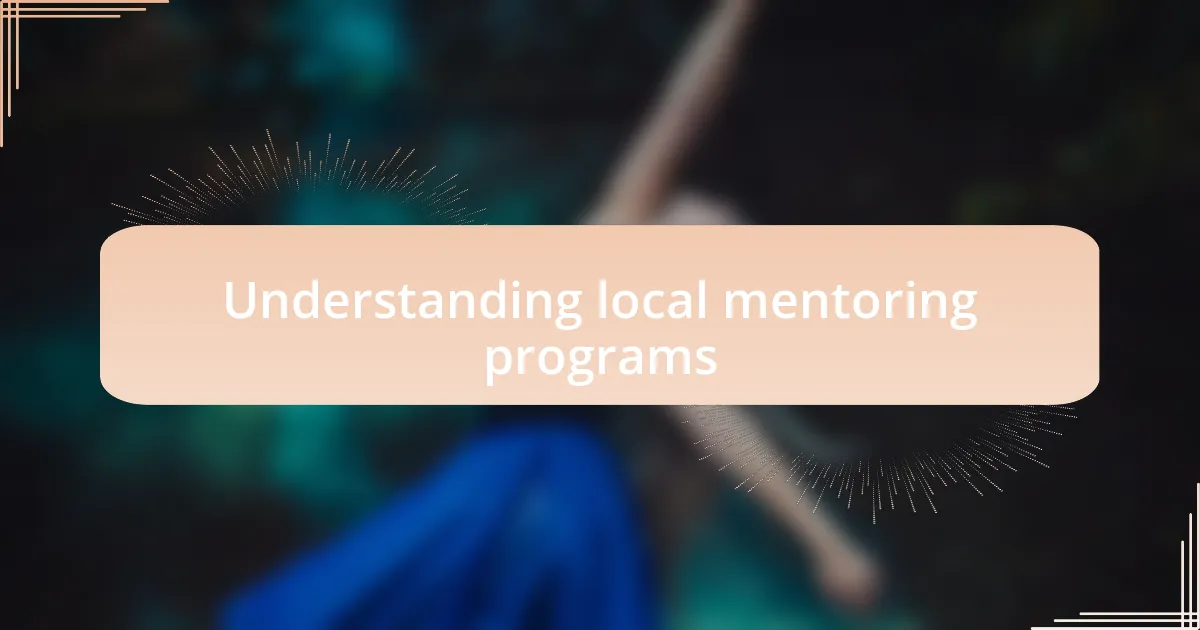
Understanding local mentoring programs
Local mentoring programs play a vital role in nurturing talent within the breakdancing community. I’ve personally witnessed how these programs can transform dancers from uncertain beginners to confident performers. When I first joined a local mentoring program, I found not just guidance, but a supportive family that celebrated each small victory with me.
At times, I wondered if mentoring was truly necessary, especially as an experienced dancer. However, I quickly realized that everyone, regardless of skill level, benefits from guidance and encouragement. It’s not just about improving your moves; it’s about forging connections with those who share your passion, and learning from their unique perspectives.
These programs often bring together seasoned dancers and newcomers in inspiring ways. I remember a session where a mentor shared their journey through setbacks, and it resonated deeply with me. Reflecting on my own challenges, I felt empowered to push past my limits, knowing I wasn’t alone in my struggles. Isn’t it incredible how a single conversation can ignite a new spark of motivation?
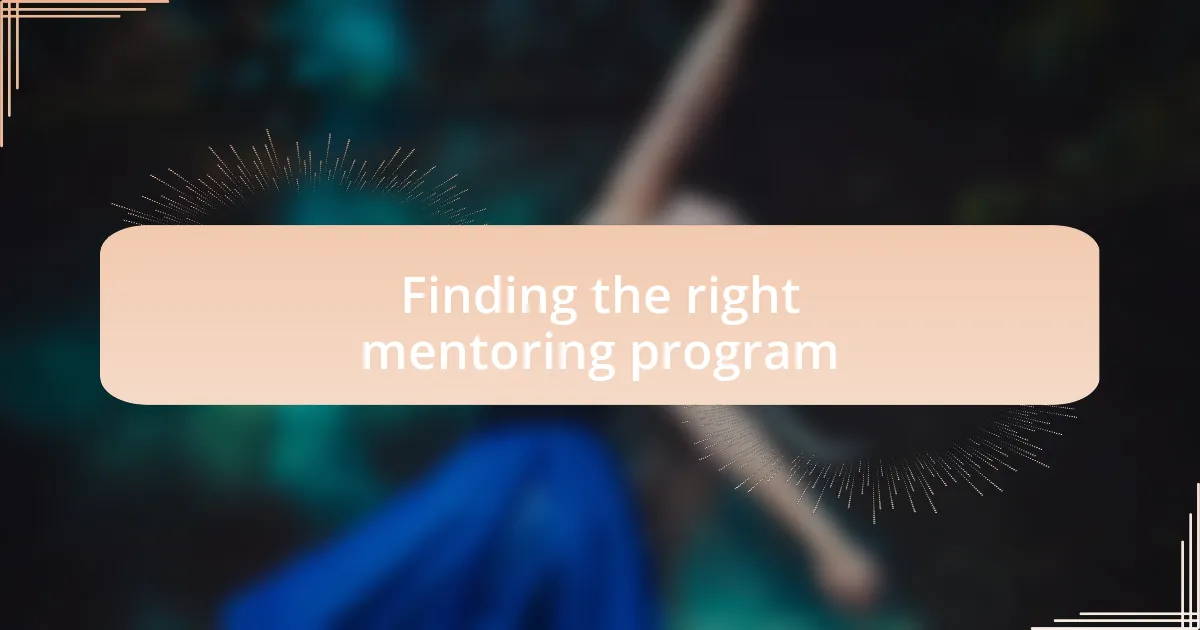
Finding the right mentoring program
Finding the right mentoring program largely depends on your individual goals and preferences. I remember walking into a community center, feeling the buzz of energy around me. There were various programs, each catering to different styles and skill levels. It made me realize that what works for one dancer might not resonate with another. Have you thought about what you want from a mentor?
It’s important to identify programs that align with your aspirations, whether you want to master foundational moves or explore advanced techniques. I once chose a program that emphasized creative expression, which helped me unlock my own unique style. The mentorship was more than just technical tips; it fostered an environment where I could experiment and grow. Wouldn’t it be amazing to find a mentor who can help you rediscover your love for breakdancing?
Finally, consider the chemistry you share with potential mentors. I found that my most productive sessions were with mentors who genuinely understood my journey and encouraged my individuality. A good mentor should inspire trust and openness, making you feel comfortable to unveil your true self. Isn’t it worth taking the time to find someone who makes you feel that way?
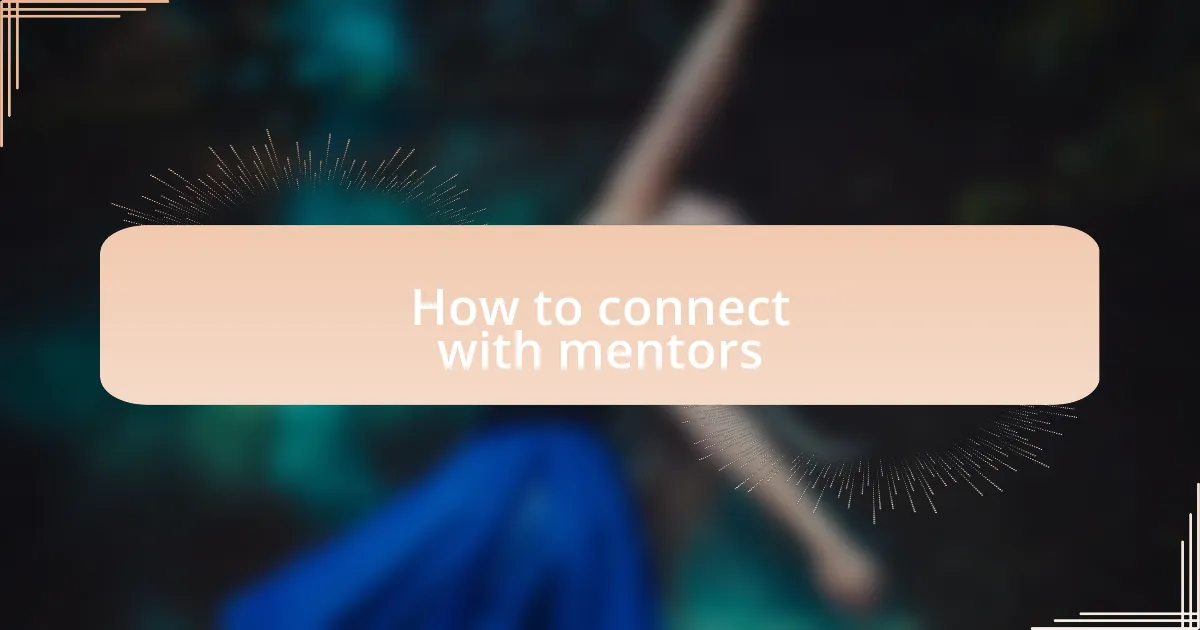
How to connect with mentors
Connecting with mentors can sometimes feel daunting, but it doesn’t have to be. I remember that first moment when I reached out to a seasoned dancer in my community. I simply sent a message expressing my admiration and eagerness to learn. To my surprise, he replied with enthusiasm, inviting me to a practice session. This simple act of reaching out opened doors I never expected.
Networking events can also be invaluable. I was fortunate to attend a local breakdancing competition where many experienced dancers congregated. I took the plunge and introduced myself to a few, sharing my goals and aspirations. Engaging in genuine conversations made it easier to ask them about mentorship. Often, it’s in these informal settings that connections spark and lead to meaningful relationships.
Don’t underestimate the power of social media in this process. I found that following local dancers and engaging with their content allowed me to build relationships over time. Commenting on their posts and sharing my journey created an organic way to establish rapport. Have you considered how your online presence could play a role in attracting mentors? The digital landscape can become a bridge to real-world connections.
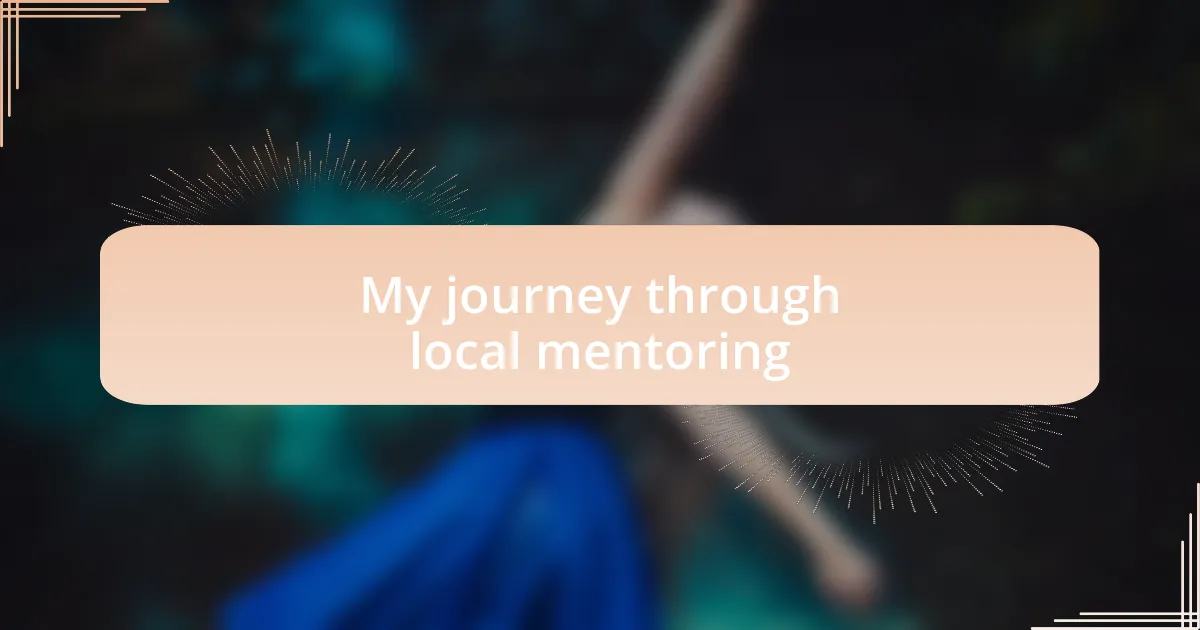
My journey through local mentoring
It was during one of those late-night practice sessions when I first experienced the true essence of local mentoring. I remember feeling overwhelmed by the sheer talent surrounding me, but as I stumbled through a move, an experienced b-boy named Marcus stepped in. He paused the music and offered to break it down for me, explaining not just the steps, but the passion that fuels them. In that moment, I understood that mentoring isn’t just about teaching techniques; it’s about sharing a love for the art.
As I continued to attend local meetups, I began forming friendships that blossomed into mentoring relationships. I’ll never forget the day a fellow dancer invited me for coffee to discuss my progress. Over steaming cups and candid conversation, he opened up about his own struggles, making me realize I wasn’t alone. This kind of vulnerability not only solidified our bond but also fostered an environment where I felt comfortable asking questions and seeking guidance.
What really struck me was how mentorship goes both ways. While I learned invaluable techniques and mindset shifts from my mentors, I found myself mentoring a newcomer in the community. Explaining to them the basics and sharing my journey made me reflect on how far I had come. Isn’t it fascinating how the act of teaching can reinforce your own knowledge? This cycle of learning and teaching created a vibrant tapestry within our local scene, enriching all our experiences.
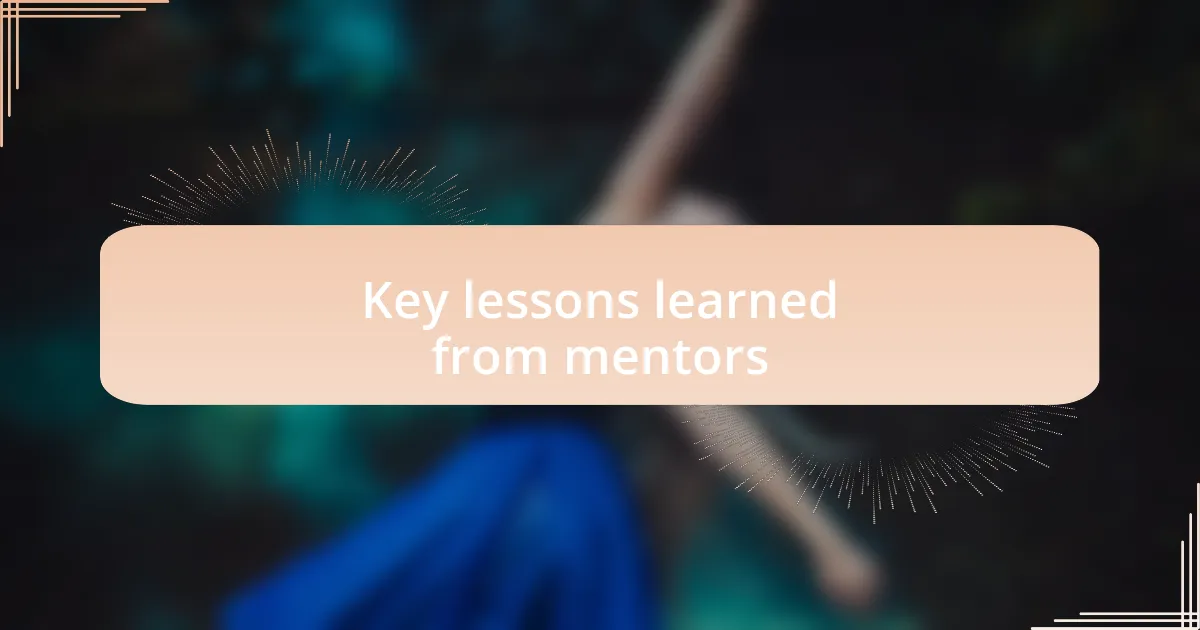
Key lessons learned from mentors
During my time in the local mentoring scene, I learned that resilience is perhaps one of the most crucial attributes for any dancer. One evening, after struggling to master a particularly challenging move, my mentor, Jenny, pointed out that every dancer falls and fails repeatedly before achieving success. That moment struck a chord with me. Why do we fear failure when it often leads to growth? Embracing setbacks turned out to be a key lesson, reinforcing my determination to keep pushing forward, regardless of how many times I stumbled.
Another valuable insight was the importance of individual style. I remember a conversation with another mentor, Sam, who emphasized that each dancer has a unique story to tell through their movements. He would often say, “Don’t just dance; let your body express who you are.” This perspective empowered me to explore my identity through breakdancing, encouraging me to be authentic rather than merely imitating others. How liberating it felt to find my voice among the beats!
Mentors also taught me the significance of community and support in our journeys. One day, during a local battle, I noticed how my fellow dancers rallied around each other, cheering, encouraging, and offering constructive critiques. I realized that mentorship thrives in an environment where collaboration is prioritized over competition. This sense of belonging became a beacon of motivation, showing me just how vital it is to uplift one another in our quests for improvement. Have you considered how much strength lies in lifting others while you rise?
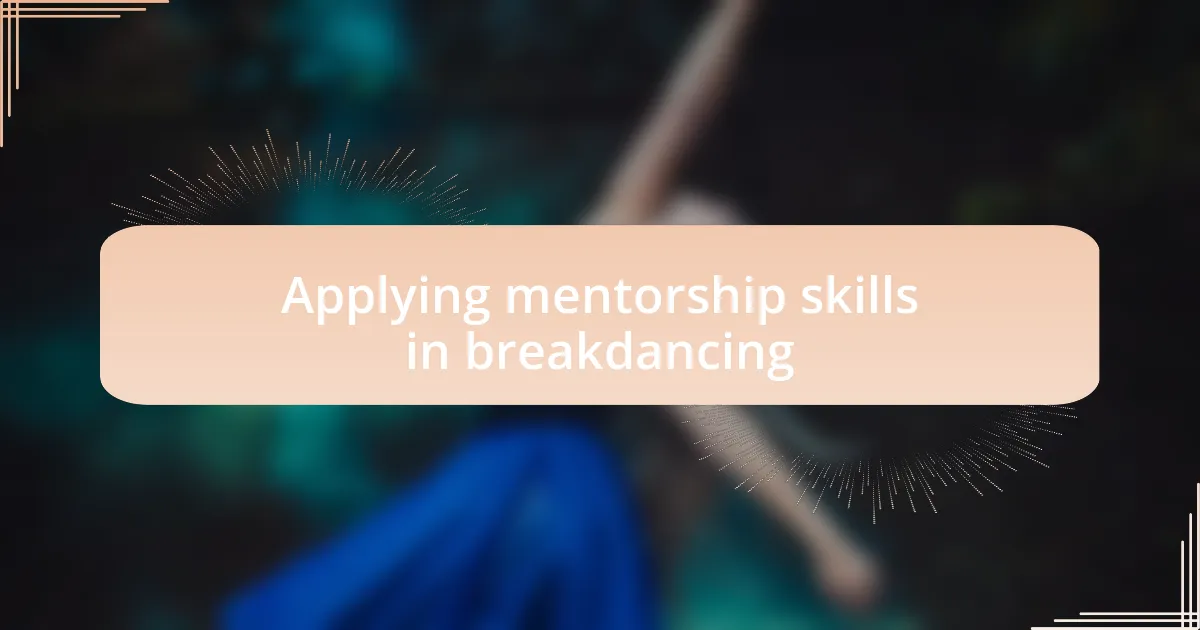
Applying mentorship skills in breakdancing
As I began applying my newfound mentorship skills to breakdancing, I discovered the power of intentional feedback. Reflecting on my time with my mentor, I recall a moment when I was critiquing a younger dancer’s performance. Instead of focusing solely on what needed improvement, I chose to highlight their strengths first. This approach not only boosted their confidence but also fostered a positive atmosphere. Have you ever noticed how encouragement can transform the way someone perceives their own abilities?
Moreover, I learned about the importance of setting achievable goals. When I started mentoring a new dancer, I encouraged them to break down complex routines into smaller, manageable parts. We set weekly milestones, and I vividly remember the smile on their face when they finally nailed a tough sequence. This experience taught me that mentorship isn’t just about guidance; it’s also about celebrating the small victories that pave the way to larger achievements. Isn’t it incredible how those little moments can fuel a dancer’s passion?
Collaboration, another critical lesson I applied, came alive during practice sessions. Sharing techniques with peers transformed my own understanding of moves. I often recall how one freestyle session led to spontaneous exchanges of styles that pushed boundaries for everyone involved. This mutual learning reignited my love for breakdancing and highlighted that mentorship flows in both directions. Have you thought about how learning from others can enhance your own skills as much as teaching them?